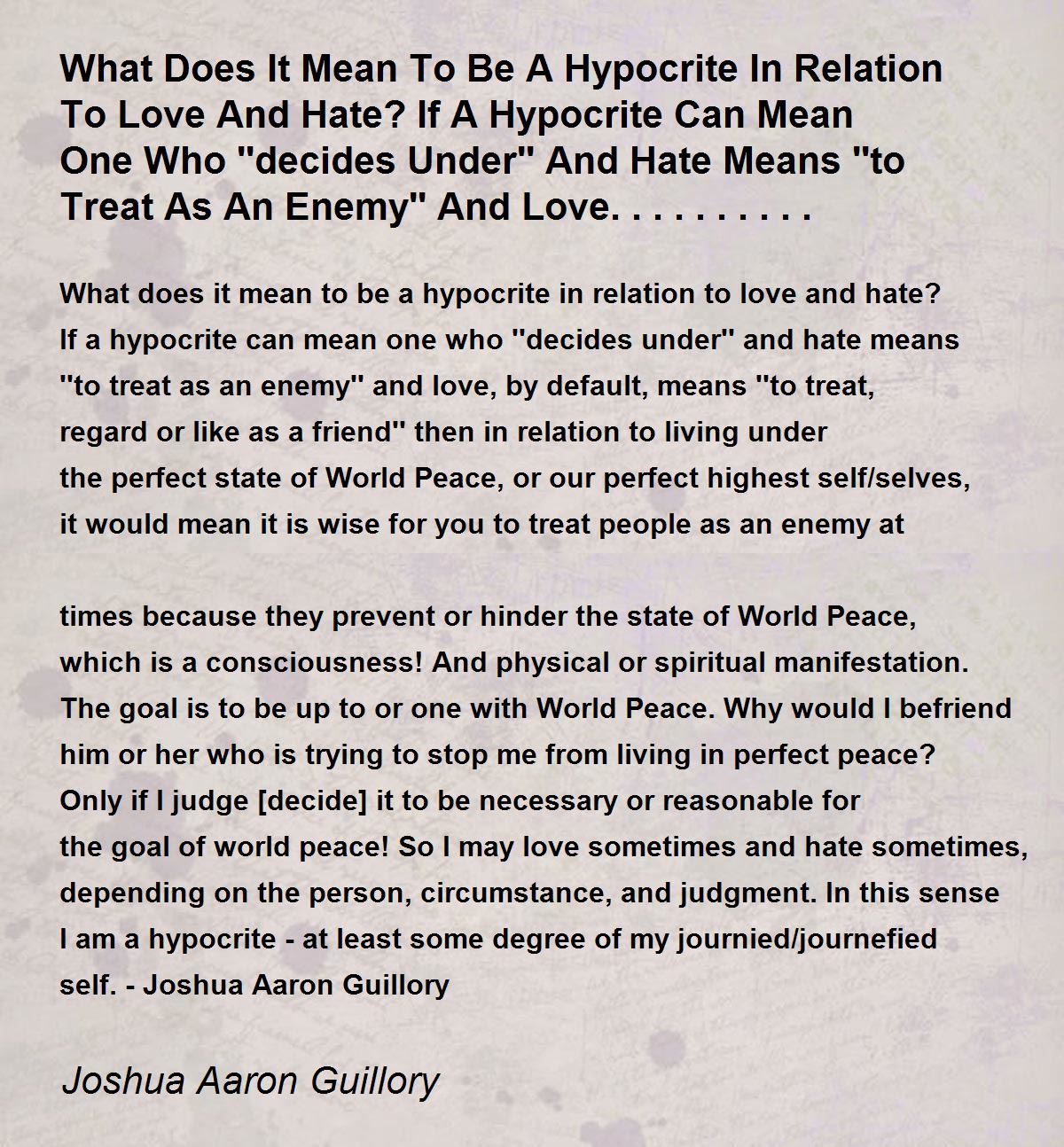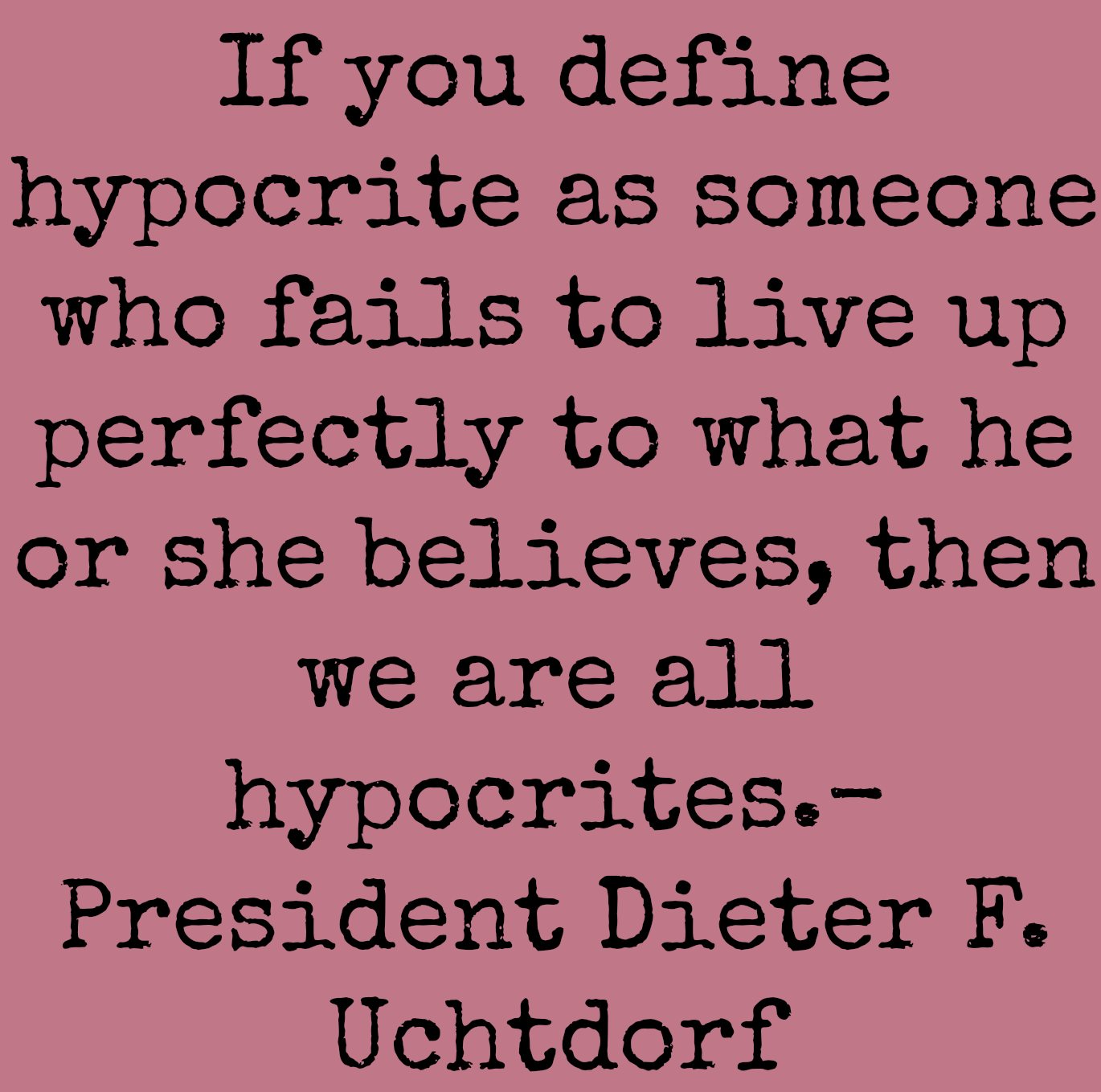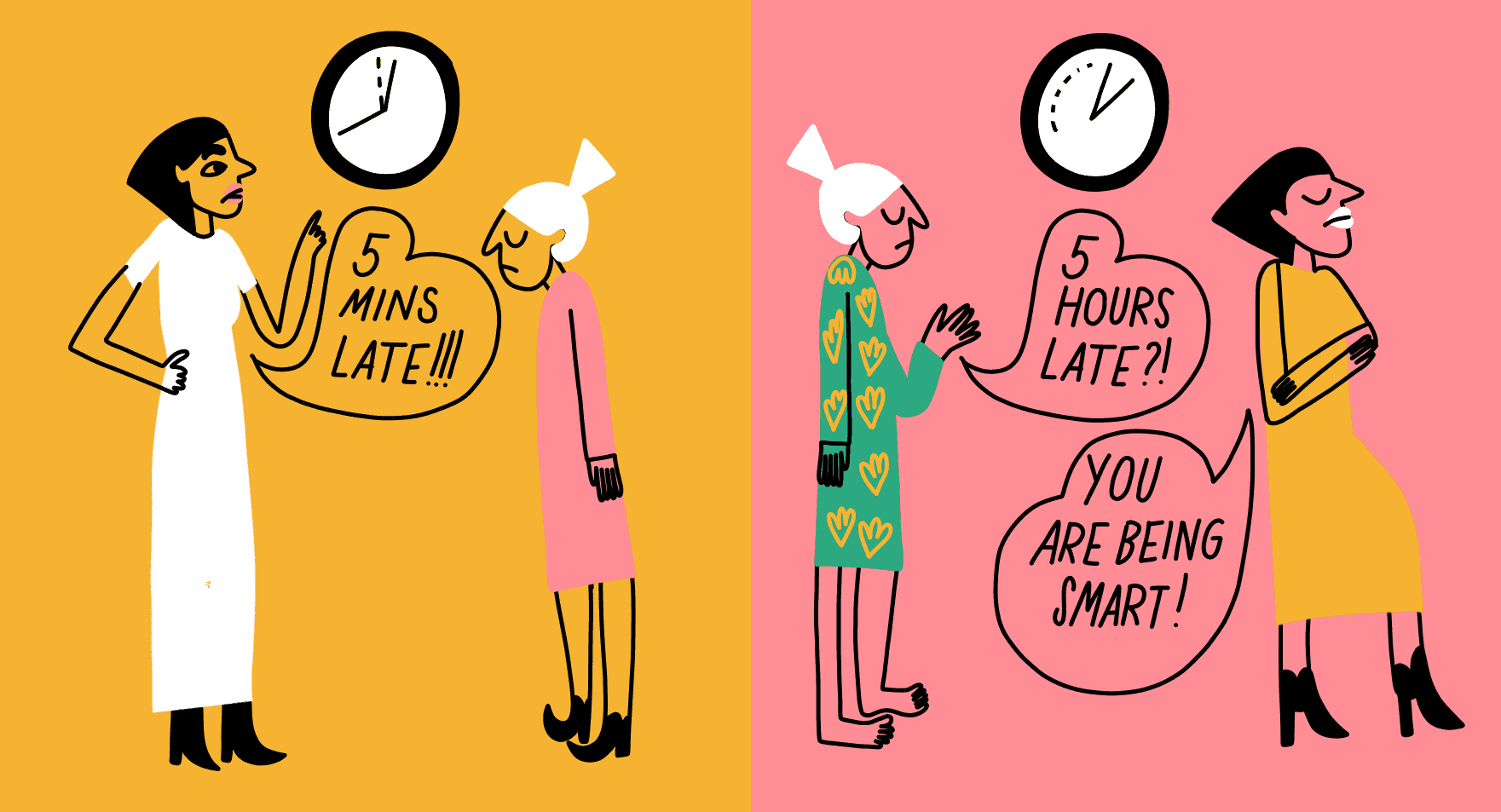Have you ever noticed someone saying one thing, yet doing something completely different? It's a familiar feeling, isn't it? This disconnect between words and deeds often brings up a rather strong word: hypocrite. It's a term we hear quite a bit, whether in everyday conversation, when talking about public figures, or even when we're quietly thinking about our own actions. This idea of not practicing what you preach can feel a bit unsettling, and it really makes you wonder about the true nature of integrity.
The concept of hypocrisy touches upon something very basic in human interactions: trust. When someone presents themselves in a certain way, perhaps claiming to hold specific values or beliefs, and then behaves in a manner that completely goes against those very claims, it can shake our sense of what's real. So, what does it mean to be a hypocrite, truly? It's more than just a simple mistake or a momentary lapse; it points to a deeper inconsistency, you know, a sort of double standard.
In this discussion, we'll explore what it truly means to be a hypocrite, looking at its origins and how it shows up in our daily lives. We'll also consider insights from various perspectives, including some very old and wise texts, which offer a lot of clarity on the subject. We'll even talk about how one might move past such behavior, or how to better understand it when you see it. It's about getting a clearer picture, more or less, of this rather common human trait.
Table of Contents
- The Core Idea: What a Hypocrite Really Is
- A Look at the Origins of the Word
- Hypocrisy in Everyday Moments
- Deeper Meanings: Perspectives from Sacred Texts
- Understanding the Difference: Hypocrisy vs. Hypocrite
- How to Spot Hypocrisy (and Maybe Yourself)
- Moving Beyond Hypocrisy: Steps for Change
- Common Questions About Hypocrisy
The Core Idea: What a Hypocrite Really Is
At its very heart, a hypocrite is someone who says one thing and does another. This is a person who preaches a particular idea, or perhaps a set of principles, but then their own actions don't quite line up with those stated beliefs. It's a kind of mismatch, you see, between what's spoken and what's actually carried out. This fundamental definition really gets to the core of the issue, showing a clear inconsistency.
Consider this, for example: someone might strongly criticize others for wearing fur, talking about animal welfare and ethical choices. Yet, when the weather turns cold, they might just pull out their own large mink jacket. That's a pretty clear example of the kind of behavior we're talking about. The words spoken about animal welfare don't match the personal choice made for warmth, which is sort of the defining characteristic.
More broadly, a hypocrite is someone who simply does not act according to their stated principles or beliefs. This means a person who pretends to be what they are not. They might present a certain image to the world, suggesting they hold specific virtues or moral standards, but their private conduct, or even other public actions, tell a different story. It's about a claim to something that isn't truly lived out, basically.
This idea extends to those who claim or pretend to have certain beliefs about what is right, but whose behavior then disagrees with those very beliefs. The disconnect is the key element here. It's not just about making a mistake; it's about a pattern where outward declarations are at odds with actual conduct. This behavior, in a way, can undermine trust and genuine connection.
A Look at the Origins of the Word
The word "hypocrite" has a rather interesting past, reaching all the way back to ancient Greek. It's derived from the Greek word 'hypokritēs,' which originally referred to a stage actor. Think about it: an actor on a stage puts on different masks, playing a role that isn't their own true self. This etymological origin really helps us grasp the deeper meaning of the word, doesn't it?
So, in its initial sense, 'hypokritēs' meant someone who played a role, someone who was performing. This connection to acting is quite telling, as a hypocrite in our modern sense also performs a role. They put on a front, pretending to have virtues or moral qualities that they might not actually possess. It's like wearing a mask in everyday life, you know, to fit in or to be seen in a particular light.
This ancient meaning is still very much alive in how we use the word today. When we talk about hypocrisy, we're often talking about a kind of performance, where someone claims or pretends to have beliefs that they don't truly embody. Our love, for instance, should be without this kind of "hypocrisy," meaning it should be genuine, not just an act. It's about authenticity, more or less, rather than just outward show.
Hypocrisy in Everyday Moments
Hypocrisy shows up in countless everyday situations, often in ways that can be quite subtle, or sometimes very obvious. It's not just about grand moral failings; it can be seen in smaller, more common interactions too. For instance, someone who constantly complains about others being late, yet consistently arrives behind schedule themselves, is exhibiting a form of this behavior. It’s a very common pattern, isn't it?
Another example might be a person who preaches about the importance of honesty and transparency in all dealings, but then quietly bends the rules or exaggerates facts when it benefits them personally. This kind of double standard can be quite frustrating to witness, especially when it comes from someone you might expect better from. It highlights the gap between what is said and what is done, basically.
Consider a friend who advises you to save money and avoid impulsive purchases, yet they themselves are always buying the latest gadgets or going on extravagant trips. Their advice, while perhaps well-intentioned, loses some of its impact because their own actions don't reflect it. This is that familiar situation where someone talks a good game, but doesn't quite play it themselves, you know?
These daily occurrences, while perhaps not as dramatic as some larger examples, still show the core idea of hypocrisy. It’s about a person claiming to have certain beliefs or qualities, but then behaving in a way that truly contradicts those very claims. This contradiction, apparently, is what makes the behavior stand out and feel inconsistent to others. It’s a subtle dance between words and actions, in some respects.
Deeper Meanings: Perspectives from Sacred Texts
The idea of hypocrisy is not new; it's been discussed and cautioned against in many ancient and sacred texts, offering profound insights into human nature and morality. These texts often go beyond just the outward actions, looking at the intentions and the heart behind them. It’s a very old concern, really, about genuine living.
Self-Reflection: The "Plank in Your Eye"
One powerful lesson comes from Matthew 7:5, which says, "you hypocrite, first take the plank out of your own eye, and then you will see clearly to remove the speck from your brother’s eye." This passage suggests that before we try to change or correct someone else, we should first look at ourselves. It’s a call for self-examination, isn't it?
The idea here is that it's much easier to spot flaws in others than in ourselves. The "plank" in our own eye represents our own significant faults or inconsistencies, which might be much larger than the "speck" we see in someone else. This teaching really emphasizes personal responsibility and humility. It implies that genuine help for others starts with honest self-assessment, a very important step, you know.
This perspective teaches us that true wisdom involves recognizing our own imperfections before pointing out those of others. It’s a way of saying, "look inward first." This focus on internal reflection rather than immediate external judgment is a key part of understanding hypocrisy from this viewpoint. It's about cleaning up your own house, so to speak, before trying to clean up someone else's, which is quite practical.
Beyond Appearances: True Motivation
Another insight from Matthew 6:5 highlights the importance of motivation. Jesus states, "and when you pray, do not be like the hypocrites, for they love to pray standing in the synagogues and on the street." This means that our motivation is as crucial as our conduct. It’s not just about what you do, but why you do it, apparently.
The hypocrites in this context were praying in public not out of genuine devotion, but to be seen and praised by others. Their outward act of prayer was a performance, lacking true sincerity. This teaches us that actions done for show, or for personal gain rather than pure intention, can be a form of hypocrisy. It’s about the heart's true condition, you know, more than just the external display.
This perspective encourages us to examine our own hearts and intentions. Are we doing things for genuine reasons, or are we seeking applause or recognition? This emphasis on internal purity over outward display offers a deeper look at what it means to be truly consistent. It's a reminder that authenticity comes from within, basically, not from what others observe.
Belief Versus Behavior
Sacred texts, like the Quran and Sunnah, also touch upon this topic, often referencing those among the Muslims who say they believe but behind their backs disbelieve and plot against. This highlights a profound internal conflict: a person professing faith outwardly while harboring doubt or malice inwardly. It’s a very serious form of inconsistency, isn't it?
This idea of internal disbelief contradicting outward claims of faith speaks to the very core of hypocrisy. It's about a hidden agenda or a lack of true conviction despite a public declaration. Like an actor puts on different masks, many religious people might feel they need to don a mask to fit in at church or to appear good enough for God. This creates a disconnect between what is truly felt and what is presented, you know.
The implication is that simply saying you believe something is not enough; your inner state and actions should align with that belief. If you knowingly commit a sin while claiming piety, that too can fall into this category. It's a call for genuine alignment between one's inner world and outer life, a very important aspect of integrity, really.
Understanding the Difference: Hypocrisy vs. Hypocrite
It's important to make a clear distinction between "hypocrisy" and "hypocrite." While they are closely related, they refer to different aspects of the same issue. Hypocrisy refers to the behavior itself, the act of pretending to have virtues, moral principles, or beliefs that one does not actually possess. It is the conduct, the pattern of inconsistency, basically.
On the other hand, a hypocrite is the individual who engages in that behavior. It’s the person exhibiting the hypocrisy. So, hypocrisy is the abstract concept, the pattern of actions that contradict stated beliefs, while a hypocrite is the living, breathing person doing those things. This distinction helps us talk about the issue with more precision, doesn't it?
Think of it this way: you can observe an act of hypocrisy, but you identify a person as a hypocrite. One is the noun for the action, the other is the noun for the doer. This clarity is quite helpful when discussing such a sensitive topic. It helps separate the behavior from the individual, allowing for a more focused conversation, you know, about what's actually happening.
How to Spot Hypocrisy (and Maybe Yourself)
Deciding who really is a hypocrite, or even recognizing it in ourselves, can be a bit tricky. People are often accusing each other, and sometimes even accusing you, of being one. So, how do we decide who really fits the description, and how should we approach this? It’s a delicate balance, obviously, between observation and judgment.
The primary way to spot hypocrisy is by observing a consistent pattern where someone's words and actions simply don't match. If a person claims to value environmental protection but consistently uses excessive resources without care, that's a pretty clear sign. It’s about looking for that ongoing contradiction, you know, rather than just a one-off mistake.
Another indicator is when someone applies different standards to themselves than they do to others. If they harshly criticize a minor fault in someone else, but overlook or excuse the same fault in themselves, that's a strong hint. This double standard is a hallmark of hypocritical behavior. It’s a bit like having one rule for everyone else, and another, more lenient one, for yourself, basically.
When it comes to spotting it in yourself, that's where the "plank in your own eye" idea comes in. It requires honest self-reflection. Ask yourself: "Am I truly living by the values I preach?" Or, "Do I expect things from others that I don't demand from myself?" This kind of internal questioning can reveal inconsistencies that you might not have noticed otherwise. It’s a courageous step, really, to look inward like that.
Moving Beyond Hypocrisy: Steps for Change
If you've recognized some inconsistencies in your own behavior, or if you simply want to ensure you're living with more integrity, there are steps you can take. To stop being a hypocrite, we must first examine our own moral code and determine whether there are any contradictions in it. This initial self-assessment is a very important part of the process, you know.
Start by identifying your core beliefs and principles. What do you truly stand for? Write them down if it helps. Then, honestly review your recent actions and decisions. Do they align with those stated beliefs? If you find areas where your actions contradict your principles, that's where you need to focus your attention. This kind of self-audit is quite revealing, honestly.
One powerful tool to help us is the concept of objective morality. This involves looking at what is universally considered right or wrong, rather than just what feels convenient or self-serving at the moment. By grounding your actions in a consistent, external standard, you can reduce the likelihood of internal contradictions. It provides a steady compass, basically, for your moral choices.
Being a person who acts in contradiction to what one claims to believe or feel is a condition that can be changed. It requires a willingness to be honest with yourself, even when it's uncomfortable. It also involves making a conscious effort to align your words with your deeds, even in small ways. This journey towards greater consistency is a continuous one, you know, but it’s very rewarding.
Remember, true authenticity comes from living in alignment with your deepest values, not just presenting a certain image. It's about closing the gap between who you say you are and who you actually are. Learn more about personal integrity on our site, and perhaps explore this page on ethical living for further insights. This path leads to a more genuine and peaceful way of being, and that, is that.
Common Questions About Hypocrisy
People often have questions about this topic, so let's touch on some common ones that come up, more or less, in discussions about hypocrisy.
What is the definition of a hypocrite?
A hypocrite is someone who claims or pretends to have certain beliefs or moral standards but behaves in a way that contradicts those very claims. It's a person who says one thing and does another, basically, showing a clear inconsistency between their words and their actions. This disconnect is the core of the matter, you know.
How can you tell if someone is a hypocrite?
You can often tell if someone is a hypocrite by observing a pattern where their actions consistently go against their stated principles. For example, if they preach kindness but act cruelly, or advocate for honesty but frequently lie. It's about noticing that ongoing gap between what they say and what they actually do, you know, over time.
Can a person stop being a hypocrite?
Yes, a person can absolutely stop being a hypocrite. It starts with honest self-reflection, examining one's own moral code for contradictions, and then making a conscious effort to align actions with stated beliefs. It requires a commitment to genuine consistency and a willingness to be authentic, you know, even when it's hard. It’s a process, but it’s very possible.



Detail Author:
- Name : Chase Considine
- Username : ward.afton
- Email : fannie79@corkery.com
- Birthdate : 1985-04-18
- Address : 3789 Koelpin Terrace Tillmanberg, SC 31035-6714
- Phone : 206-486-7430
- Company : Funk-Klein
- Job : Automotive Technician
- Bio : Ea consequatur incidunt omnis et quae qui porro. Accusamus cumque nihil aut accusamus. Voluptatem delectus deserunt aliquid sed culpa quia.
Socials
twitter:
- url : https://twitter.com/alankoepp
- username : alankoepp
- bio : Pariatur earum nobis sit voluptate nulla molestiae earum. Quo ut illo et qui consectetur magnam laudantium. Et incidunt ut fugiat odit quia tempore quos sed.
- followers : 5106
- following : 1884
facebook:
- url : https://facebook.com/koeppa
- username : koeppa
- bio : Autem velit eligendi qui dignissimos perferendis quasi consequatur.
- followers : 6180
- following : 2297